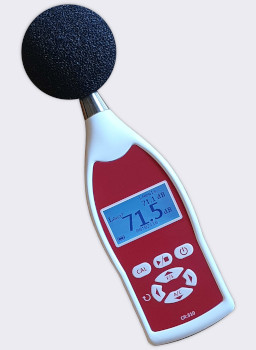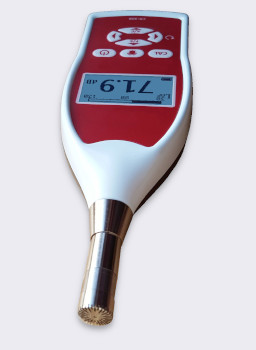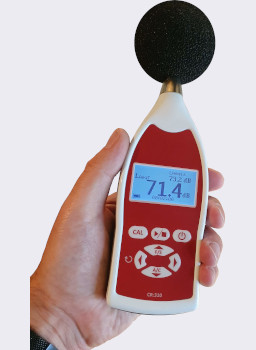



The delivery price is calculated during checkout based on your location and the goods ordered. Our basic delivery prices are:
Delivery within Ireland: €27.00
Delivery Service: Three working days*
* For products that are in stock and the order received by midday.
Some products go through a final configuration and calibration before being shipped. If the calibration labs are busy this can add up to two days on to the delivery schedule but guarantees a fresh calibration.
The CR310 is an Integrating Sound Level Meter. In addition to the usual Fast/Slow sound level measurements it provides the integrated, average sound level Leq. The measurement of "A" weighted Leq (or LAeq) along with "C" weighted Peak (or LCPeak) make it ideal for noise at work surveys in line with the EU regulations.
It is essential that a sound level meter meets these standards if it is to be used for any important measurements. The CR310 meets the strict demands of the international standards and is provided with a Calibration Certificate at no extra cost, so you can make your noise measurements with confidence.
The CR310 measures the A or C weighted sound level and Leq, and the C weighted Peak. The sound level can be measured with either Fast or Slow time response.
For applications such as noise at work the average sound level (LAeq) is usually used as it is much better than trying to average by eye. This is also a requirement for many occupational noise regulations. For other non-integrating applications the Max Hold feature makes the measurement of the maximum sound level easier.
An AC output and optional DC output mean this meter can be connected to a level recorder, PC equipped with an A/D converter or integrated with another data logging system.
See Specifications tab for more details about the standards and noise measurement range.
The European noise at work regulations and guidelines state that you should use a Class 2 Integrating Sound Level Meter to measure the LAeq ("A" weighted Leq) and the LCpeak ("C" weighted Peak) in order to assess worker noise exposure levels.
The CR310 meets these requirements and comes with a traceable calibration certificate.
The noise at work regulations state that you should check a meter's function before making measurements, so you also need a Sound Level Calibrator. For this reason we recommend the CK310 Noise Measurement Kit as it includes everything that you need for a noise at work assessment.
The CR310 is a calibrated integrating sound level meter with no data logging and no additional software. As many applications require a single reading to be made, it is often easier to note it down manually than to connect to a computer and download it. For those applications the CR310 is ideal.
If your measurement regulations or guidelines state that you need a Class 2 Integrating Sound Level Meter, or they require the measurement of LAeq, LCeq or LCPeak then this meter meets those demands.
Although not a data logging meter, the CR310 has an AC output and a DC output, making it ideal for connection to a data logging system via a suitable A/D converter.
The CR310 sound level meter shows the current sound level as soon as it is switched on. To start measuring the average sound level, or Leq, press the run button.

As the meter runs it shows the average sound level over the measurement period, the LAeqT, along with the current level every second, or LAeq1s.
You can also view parameters such as the LCPeak, minimum and maximum sound levels.

The noise at work regulations require regular calibration checks using a Sound Level Calibrator, which is included in the CK310 Noise Measurement Kit. To check the meter's calibration you put the calibrator over the microphone, switch it on and press the Cal button. The meter makes any adjustments automatically.
The CR310 sound level meter can be bought on its own, with a calibrator or as part of a Noise Measurement Kit (meter, calibrator, case). Please check your regulations to see whether you need a Calibrator, or contact us for advice before ordering.
Our noise measurement kits are designed to include all the parts needed, enclosed in a carrying case.
For more information about the calibrator, please visit the CR514 Sound Level Calibrator page.
| Standards | IEC 61672-1:2013 Class 2 |
| ANSI S1.4, IEC 60804, IEC 60651 Type 2 | |
| Range | 30 dB (A) to 130 dB (A) |
| 40 dB (C) to 130 dB (C) | |
| Frequency weighting | A and C |
| Time weighting | Fast (F) and Slow (S) |
| Display functions | Sound level, maximum, minimum, C peak |
| Measurements | LAeq, LCeq, LAF, LAS, LCF, LCS, LCpk |
| Noise floor | < 25 dB (A)and 35 dB (C) |
| Resolution | 0.1 dB |
| Display flags | Overload, under-range |
| Auto cal. range | ±4.5dB |
| Reference point | 94dB (1kHz), 92.9dB (8kHz) |
| Settling time | 60s |
| Display | Backlit 128×64 LCD, resolution 0.1 dB |
| Electrical inputs | 5V power in via mini USB |
| Power | 2 x AA/LR6 1.5V batteries |
| Or 5V DC via Mini USB | |
| Battery life | 24 hours |
| Microphone | 1⁄2” pre-polarised electret condenser type HY:205 |
| Operating temperature | 0°C to +40°C |
| Operating humidity | 25% to 90% |
| Atmospheric pressure | 65 kPa to 108kPa |
| Storage temperature | -20°C to +60°C |
| Dimensions | 215 × 68 × 32 mm |
| Weight | 220 g (including battery) |
| Electrical outputs | AC (Tip 3.5 mm jack) and DC (middle 3.5 mm jack) |
| DC output | voltage 15mV/dB, range 450mV to 1950mV |
| AC output | RMS 2V |
| Tripod Mount | 1/4" Whitworth socket |